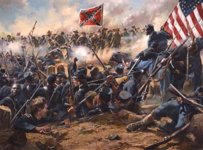Ok, hopefully this one will get some more activity going here.
Best/Favorite ACW Cavalry commander?
For me it’s John Buford. His contribution to the Battle of Gettysburg is absolutely vital to the entire epic. His main mission was to provide a screening force that could locate elements of Lee’s army and report back any significant pieces of intelligence to higher headquarters. Once the rebels were located he quickly determined the enemy’s intentions. He maintained communication with the lead elements of the Army of the Potomac and on his own initiative shifted his role from that of operational reconnaissance to the tactical defense.
It took a significant amount of intuition and tactical foresight for a division commander of the mounted arm to recognize the key positions (Cemetery & Culp’s Hills) needed to be held. Not only did Buford accomplish this, he also realized that his own force was incapable of holding off the amount of combat power he expected to be brought to bear on his smaller force. Based on this buttssment, he devised and executed a plan that allowed his troopers to trade space for time. By positioning his forces on the outskirts of the northwest side of town, he was able to hold off the vanguard of the Army of Northern Virginia until supporting Union forces could arrive on the scene.
Plus who can resist a charachter played by the legendary Sam Elliot.
“We’re gonna hold ‘em in the morning. We’ll have to fight like the Devil to hold our own until supports arrive.”
View attachment 118105



